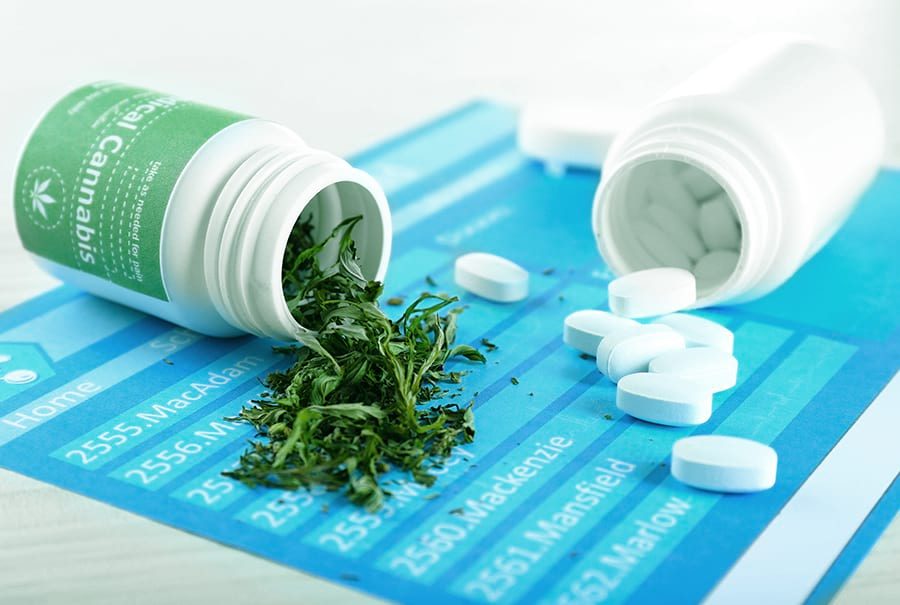Study suggests that daily cannabis use may reduce opioid consumption in patients with chronic pain
Numerous studies have supported the idea of using cannabis to treat a broad spectrum of chronic pain issues. The latest bout of research into the effects of cannabis for pain come fresh out of three prominent universities – University of California in Los Angeles, University of British Columbia and McGill University in Canada.
Growing awareness of cannabis as a medicine is prompting more patients to swap alternative medications – such as opioids – for pharmaceutical-grade buds and the plant’s derivatives.
Researchers from the universities delved into the benefits of replacing opioids with cannabis. They didn’t just explore any type of opioid, however; they focused on heroin and other opiates that are not doctor-prescribed.
“We observed an independent negative association between frequent cannabis use and frequent illicit opioid use among [people who use drugs, or PWUD] with chronic pain,” wrote the authors. “These findings provide longitudinal observational evidence that cannabis may serve as an adjunct to or substitute for illicit opioid use among PWUD with chronic pain.”
Patients who struggle to relieve chronic pain symptoms by using traditional methods of treatment may seek out stronger alternative pain-relieving substances. The problem lies in the fact that these substances tend to belong to the opioid family and are often sourced from the black market. In 2018 – according to data from the Centers for Disease Control and Prevention (CDC) – opioids killed 68,557 people in the U.S.
A team of researchers from the aforementioned universities conducted their cannabis study to determine whether cannabis may be a safer alternative to illicit opioids and related substances.
Data was gleaned from two studies to determine the effects of cannabis on opioid consumption
In order to gather their results, the cannabis study researchers analyzed data from two open prospective cohort studies. Their findings were published in PLOS Medicine.
The studies that were examined by the team focused on drug consumers located in Vancouver, Canada. In total, 1,152 people took part in the study. Each study subject self-reported experiences of serious or ongoing pain between the years 2014 and 2017.
“We found that people who used cannabis every day had about 50 percent lower odds of using illicit opioids every day compared to cannabis non-users,” wrote the researchers.
Within the three-year period, 455 individuals claimed to have used heroin or alternative legal pharmaceutical drugs on a daily basis during – at least – one of the follow-up stages for the cohort studies. Each follow-up period extended over six months. An additional 410 people claimed to use cannabis on a daily basis.
When the study was in its early stages, 583 subjects reported daily occasional cannabis use. Meanwhile, 269 people reported using non-medical opioids on a daily basis. After utilizing a statistical model, the researchers concluded that daily consumption of cannabis had a major impact on daily illicit opioid use.
“In this longitudinal study examining patterns of past-6-month frequency of cannabis and illicit opioid use, we found that the odds of daily illicit opioid use were lower (by about half) among those who reported daily cannabis use compared to those who reported no cannabis use,” wrote the researchers. “However, we observed no significant association between occasional cannabis use and daily opioid use, suggesting that there may be an intentional therapeutic element associated with frequent cannabis use.”
Interestingly, 148 study subjects used the plant to relieve pain; 144 used it to treat sleep disorders; 127 reported using it for stress relief; 123 relied on it as a means of reducing loss of appetite and nausea.
Study exploring the effects of cannabis on opioid consumption confirms what advocates believed
The findings of this study on cannabis’ connection with opioid use supports what advocates long believed would be a repercussion of legalization; providing patients with better access to medical grade cannabis could help dissipate the opioid epidemic.
“In the context of the current opioid crisis and the recent rollout of a national regulatory framework for cannabis use in Canada, frequent use of cannabis among PWUD with pain may play an important role in preventing or substituting frequent illicit opioid use,” the study states.
However, this does not change the fact that more clinical trials must be carried out into the potential of using cannabinoid-based therapies for pain management before it can be adopted as a treatment.








